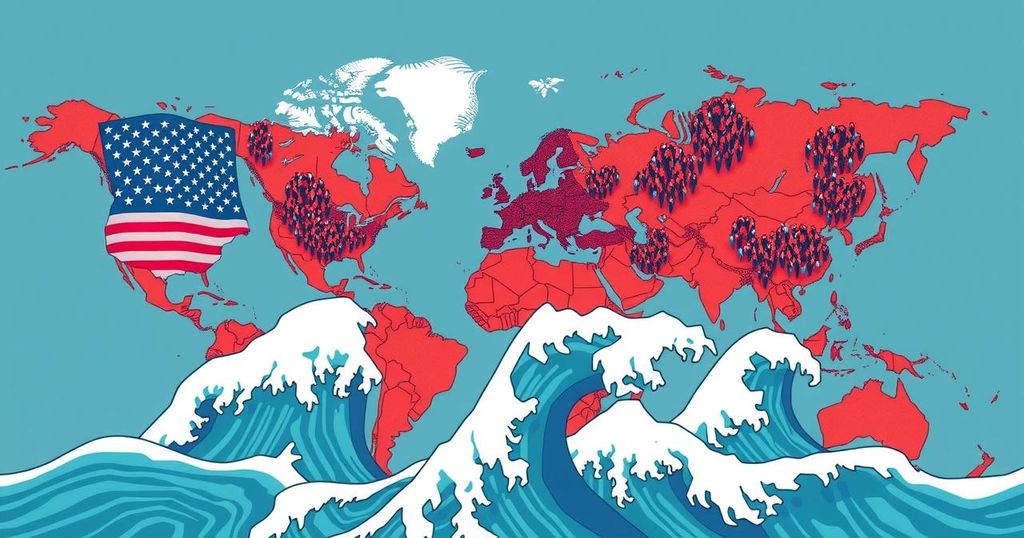The Global Anti-Incumbent Wave of 2024: A Call for Hopeful Governance

The year 2024 saw a significant global anti-incumbent wave, with leaders ousted through elections and protests. Political figures must shift from crisis management to creating a hopeful agenda. Social media and economic conditions strongly influence public trust in government, as evidenced by varying political outcomes in different countries. Engaging directly with citizens and envisioning a hopeful future is essential for restoring faith in democracy.
In 2024, a notable trend emerged worldwide as numerous political incumbents faced significant electoral defeats or were unceremoniously ejected from power. Mohammad Al Gergawi, the United Arab Emirates’ minister of cabinet affairs, articulated an essential concept: “The role of government is to design a future which gives citizens hope.” This foundational idea suggests that leaders must transition from mere crisis management to creating a proactive and inspiring political agenda for their constituents.
The scope of this global anti-incumbent sentiment is striking. For instance, Senegalese President Macky Sall suffered a decisive loss in March after he attempted to delay the presidential election. June marked significant changes as the African National Congress lost its majority in South Africa, and Indian Prime Minister Narendra Modi’s Bharatiya Janata Party also experienced a parliamentary defeat. This phenomenon of incumbent losses persisted throughout 2024, with the Labour Party’s sweeping victory in Britain and the unexpected defeats of political parties in Japan and Germany.
Several established leaders faced unrest; in August, Bangladesh’s Prime Minister Sheikh Hasina fled amid protests, while Syrian President Bashar al-Assad was compelled to seek refuge in Russia following regime collapse. Social media appears to play a crucial role in this wave of change. Studies indicate that increasing internet access often leads to diminished trust in government and heightened political polarization. In the United States, citizens have become increasingly divided, with Democrats and Republicans drifting apart and reinforcing their respective ideologies.
While early analyses suggested social media primarily amplifies far-right movements, recent elections indicate that this phenomenon does not guarantee electoral success for incumbents. In various countries, including Mexico and Spain, traditional parties managed to remain in power albeit with weakened positions, highlighting a nuanced dynamic between social media influence and electoral outcomes.
A critical insight from this electoral landscape is the necessity for governments to adapt their approach to social media, engaging directly with the electorate’s concerns. For example, advisers to Prime Minister Sir Kier Starmer in Grimsby sought to understand public sentiment by asking locals to describe the government in one word, prompting responses like “irrelevant” and “self-serving.” Thus, restoring trust in political structures demands prioritizing economic growth and empowering citizens, as evidenced by a 2022 study linking economic conditions directly to public trust.
Countries that demonstrated economic growth, such as Spain and Greece, successfully retained power for their leaders, while those like Germany, which faced economic contraction, saw instability in leadership. Political figures must envision a hopeful future beyond short-term budget constraints; some of history’s most transformative initiatives were conceived during economic hardship, such as The New Deal in the U.S. and the post-war welfare state in the U.K.
To foster a politics of hope, leaders are urged to engage with innovative thinkers who can provide forward-looking insights. Residents in Grimsby expressed a desire for governance that is “realistic” and “hopeful,” emphasizing the need for leaders to resonate with public aspirations. A government that embodies these qualities is likely to regain the trust of its citizens and reinforce democratic institutions.
In recent years, a noticeable global trend has emerged, wherein longstanding political incumbents are increasingly faced with electoral defeats or public discontent. This shift reflects broader societal changes and challenges to traditional governance models. The role of social media in shaping political sentiment and public trust has become particularly pronounced, revealing the complex interplay between technology, economics, and politics. As citizens grapple with various socioeconomic challenges, the call for political leaders to inspire hope through tangible action has gained urgency. Understanding these dynamics is crucial for interpreting the electoral shifts that have taken place and for anticipating future political landscapes.
The electoral landscape of 2024 has witnessed a profound rejection of incumbents worldwide, driven by various socio-political and economic factors, notably the influence of social media. To regain public trust, political leaders must shift their focus from surviving crises to crafting a hopeful, ambitious agenda that resonates with the needs and aspirations of the electorate. By engaging with citizens and fostering innovative solutions, leaders can work towards restoring faith in democratic institutions and paving the way for a more hopeful future.
Original Source: www.aspistrategist.org.au






